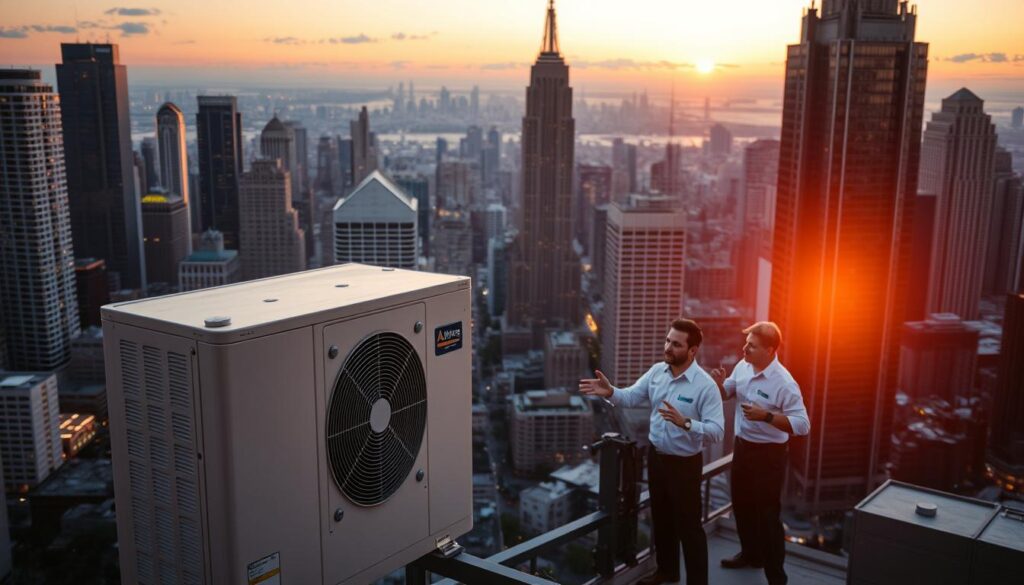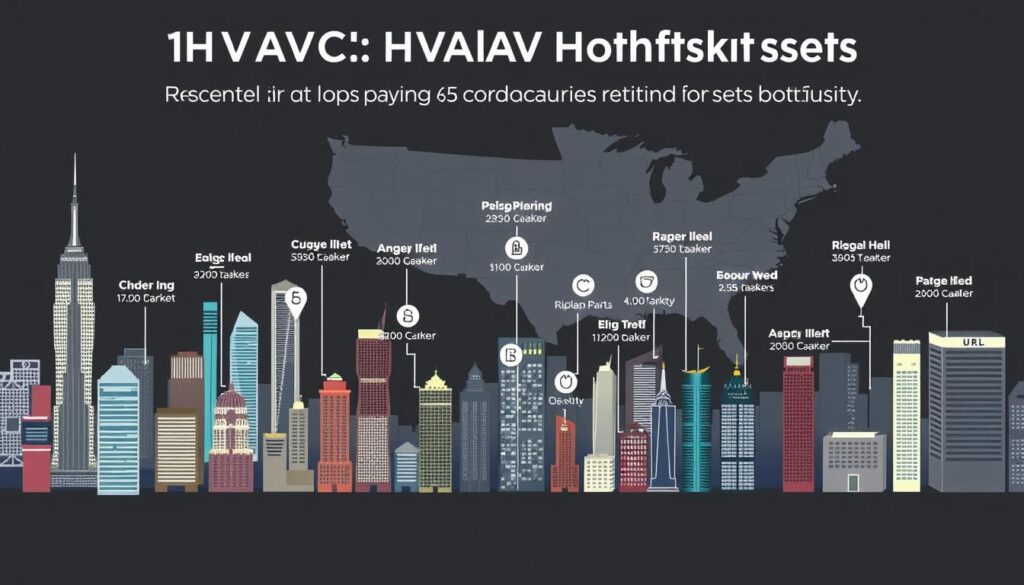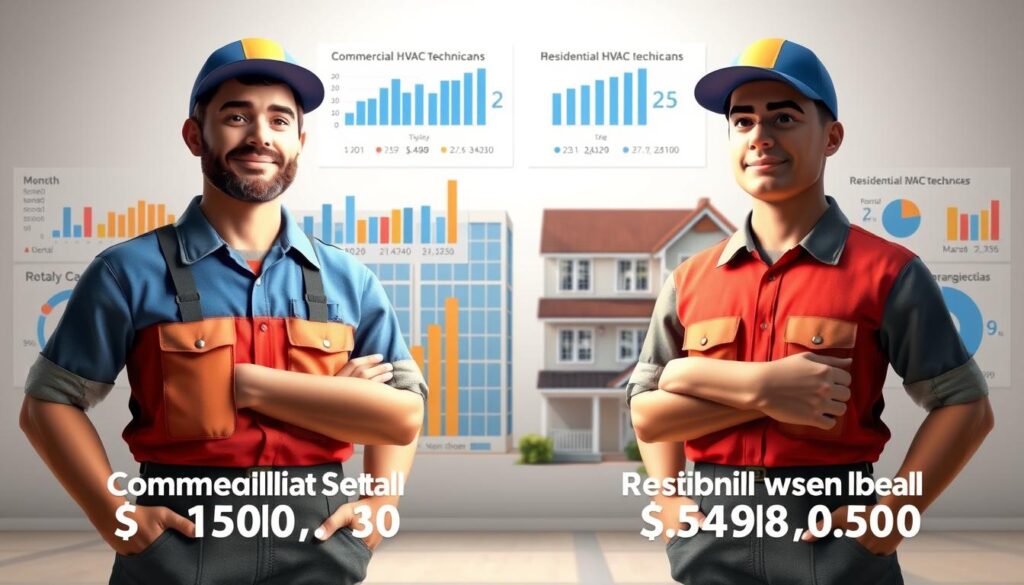Affiliate Disclosure
HVAC Guide Guys is a participant in the Amazon Services LLC Associates Program, an affiliate advertising program designed to provide a means for sites to earn advertising fees by advertising and linking to Amazon.
How Much Can HVAC Pay? Are you curious about the earnings in heating, ventilation, and air conditioning (HVAC)? The world of HVAC salaries might surprise you. It offers substantial earnings and career growth.

The Bureau of Labor Statistics says HVAC professionals make a median of $57,300 a year. That’s $27.55 an hour. This figure shows the exciting possibilities in HVAC salaries at different career stages and specializations.
Your earnings in HVAC depend on many factors. These include experience, location, specialization, and additional certifications. Whether you’re starting or looking to advance, knowing HVAC salaries helps you make smart career choices.
Key Takeaways
- HVAC offers competitive median annual wages of $57,300
- Earnings vary by experience and location
- Certifications can significantly boost HVAC salaries
- Career growth opportunities are abundant in the industry
- Specialized skills can lead to higher income
Table of Contents
Understanding HVAC Career Earnings
Exploring the financial side of an HVAC career shows promising opportunities. Your income as an HVAC technician can change a lot. This makes it a great choice for many.
The chance for high earnings is a big draw. HVAC technicians can earn well, from the start to the top of their career. With the right skills and hard work, you can make a good living.
National Average Salary Breakdown
Looking at the national salaries, HVAC technicians can earn a range. This range shows their skill and area of focus. Here’s a quick look at what you might earn:
- Entry-level positions: Starting around $37,000 per year
- Mid-career technicians: Averaging $55,000 to $65,000
- Experienced professionals: Earnings can reach up to $84,000 annually
Factors Influencing Income
Your income in HVAC depends on several key things:
- Where you work and demand in your area
- Specialized certifications you have
- How long you’ve been working
- Whether you work on homes or businesses
- How skilled you are technically
Experience-Based Salary Progression
As you get more experience, your earnings can really grow. Technicians who keep learning and improving can see big increases in their income over time.
Investing in your professional growth is key to earning more in HVAC.
Entry-Level HVAC Technician Salaries
Starting a career in HVAC can be exciting and rewarding. Entry-level technicians can earn around $22 per hour. This means they make about $45,760 a year.
Your first salary in HVAC depends on a few things:
- Where you live
- Your education
- Technical certifications you have
- The type of employer you work for
To earn more at the start, consider these steps:
- Finish vocational training programs
- Get industry-recognized certifications
- Learn specialized technical skills
- Look for apprenticeship opportunities
Pro tip: Keep learning and improving your skills to earn more from the start of your HVAC career.
The HVAC industry offers promising entry-level opportunities with significant room for professional growth and increased compensation.
Urban areas and places with high HVAC demand often pay more. States like California, Texas, and New York usually offer higher starting wages. This is compared to rural areas.
Explore Our HVAC Shop
Looking for top-rated HVAC tools, parts, and accessories? Visit our shop and find the perfect solution for your needs.
Visit the ShopHow Much Can HVAC Pay Across Different States
HVAC contractor incomes vary a lot based on where you are. The HVAC field has different pay levels in each state. This can really affect your career path.
Your earnings in HVAC can change a lot depending on your location. Some states pay HVAC pros a lot more than others.
Top Paying States for HVAC Professionals
Some states pay HVAC pros a lot more than others:
- Alaska: Highest average salaries due to extreme climate demands
- Massachusetts: Strong infrastructure and technological industries
- California: Large metropolitan markets with high technical requirements
- Washington: Robust technology and commercial construction sectors
- Connecticut: Advanced residential and commercial HVAC markets
Lowest Paying States in the Industry
Some areas pay HVAC techs less:
- Mississippi: Lower cost of living impacts wages
- Arkansas: Limited industrial infrastructure
- West Virginia: Smaller urban markets
- Kentucky: Less competitive HVAC job markets
- Tennessee: Rural-dominated employment landscape
Regional Salary Variations
Salary differences come from many factors, including:
- Local economic conditions
- Complexity of HVAC systems
- Seasonal climate demands
- Population density
- Industrial development
“Location can be a game-changer in your HVAC career earnings.” – HVAC Industry Insights
Think about these location factors when planning your HVAC career. This can help you earn more in the HVAC field.
Metropolitan Areas with Highest HVAC Salaries

Some cities are better than others for HVAC jobs. Places like San Francisco and New York City pay top dollar. This makes where you work very important for your salary.
In San Francisco, new HVAC techs can earn up to $64,200 a year. That’s $30.87 an hour. New York City isn’t far behind, with average salaries of $60,600 for newbies.
- San Francisco: Highest entry-level salary at $64,200
- New York City: Average entry-level salary of $60,600
- Boston: Strong market for HVAC professionals
- Washington D.C.: Robust government and commercial infrastructure
What makes these cities pay so much? It’s a mix of things:
- Complex urban infrastructure
- High cost of living
- Significant commercial property concentrations
- Advanced technological environments
While these cities offer great pay, remember the cost of living is high. Think about both your salary and living costs when planning your career.
Career Progression and Salary Growth
Your HVAC career offers exciting opportunities for financial growth and professional development. As you gain experience and expertise, your hvac salaries can significantly increase. This makes it a rewarding long-term career path.
Advancing in the HVAC industry isn’t just about time on the job. Your skills, certifications, and commitment to professional growth directly impact your hvac career earnings.
Experience-Based Pay Increases
HVAC professionals can expect substantial salary improvements as they progress:
- Entry-level technicians start at lower rates
- Mid-career professionals see significant pay jumps
- Senior technicians earn substantially more
Advanced Certification Benefits
Investing in your professional credentials can dramatically boost your earning. Specialized certifications show expertise and can lead to higher-paying positions.
- EPA Section 608 Certification
- NATE (North American Technician Excellence) Certification
- Advanced specialty certifications
Management Position Earnings
Reaching management levels in HVAC can substantially increase your income. Experienced professionals who move into supervisory or leadership roles can expect significant salary enhancements.
Skilled HVAC managers can earn up to 30-40% more than standard technician positions.
Explore Our HVAC Shop
Looking for top-rated HVAC tools, parts, and accessories? Visit our shop and find the perfect solution for your needs.
Visit the ShopCommercial vs Residential HVAC Pay Rates

When looking at hvac technician income, it’s key to know the difference between commercial and residential HVAC. Your pay can change a lot based on where you work.
Commercial HVAC techs usually make more than those in residential. They handle big, complex systems in places like offices, hospitals, and factories. Their skills are more in demand, leading to higher pay.
- Commercial HVAC systems need advanced technical knowledge
- Residential work often has more regular hours
- Getting special certifications can increase your income in both fields
Residential HVAC techs might start with lower pay but have more flexible schedules. They work on home heating and cooling systems, needing different skills than commercial jobs.
“Specialization is key to maximizing your HVAC earning” – Professional HVAC Industry Expert
You can move between commercial and residential HVAC. Each area offers chances to grow your skills and income. Some techs do well by becoming good at both, making their career more varied and profitable.
Things that affect how much you get paid include:
- The complexity of the systems you work on
- Where you live
- How long you’ve been working
- Any extra certifications you have
Knowing these details helps you plan your HVAC career to earn more in different settings.
Additional Income Opportunities
HVAC professionals can earn more than just a regular salary. Your skills open up many ways to make more money. This can greatly increase your earnings.
To grow your income, you need a plan and to take action. Smart HVAC technicians know that their salary is just part of what they can earn.
Performance Bonuses and Commissions
Many HVAC companies give bonuses for great service and work. These can include:
- Customer satisfaction bonuses
- Sales commission on equipment installations
- Referral rewards for new clients
- Payments for being productive
“Your skills directly translate into financial rewards in the HVAC industry.” – Professional HVAC Association
Overtime Earnings
Seasonal demand leads to overtime for skilled technicians. Summer and winter are peak times. They offer a chance to earn extra money by working more hours.
Side Job Income Options
Independent HVAC pros can use their skills in different ways. For example:
- Freelance consulting
- Weekend home repairs
- Online technical training
- Equipment maintenance contracts
By diversifying your income, you can turn your HVAC job into a successful career.
Explore Our HVAC Shop
Looking for top-rated HVAC tools, parts, and accessories? Visit our shop and find the perfect solution for your needs.
Visit the ShopBenefits and Compensation Packages
When looking at hvac contractor incomes, it’s key to see the whole picture. Your earnings aren’t just your salary. They include many benefits that can really boost your hvac earnings.
Most HVAC employers give great benefit packages to keep skilled technicians. These packages usually have:
- Health insurance coverage
- Dental and vision plans
- 401(k) retirement savings options
- Paid time off and vacation days
- Disability and life insurance
Specialized perks can make some employers stand out in the HVAC world. Some companies offer extra benefits that increase your pay:
- Tool allowances for equipment purchases
- Tuition reimbursement for professional certifications
- Apprenticeship and training programs
- Performance-based bonuses
- Vehicle maintenance or mileage reimbursement
Bigger national companies usually have better benefits than smaller local ones. Local businesses might offer a more personal work place. But, national firms often have more money and training resources.
“Your total compensation is more than just your paycheck – it’s about the complete value an employer provides.”
When you’re looking at job offers, don’t just look at the salary. Think about the long-term value of benefits, chances for growth, and career advancement in HVAC.
Conclusion
The HVAC industry is a great place for those looking for a stable and rewarding job. It offers good pay and lots of chances to grow. With a 5% job growth expected from 2020 to 2030, it’s clear the demand for skilled workers is high.
Your pay in the HVAC field depends on your experience, what you specialize in, where you work, and if you get advanced certifications. By improving your skills and aiming for areas with high demand, you can earn more. Both home and business HVAC jobs can be very profitable for those who are dedicated.
To make the most money in HVAC, plan your career well. Keep learning, get special certifications, and think about moving up to management. Cities with a big need for HVAC services often pay more. Staying up-to-date and focusing on customers will help you succeed in this changing field.
The HVAC industry is always getting better with new tech. Those who keep up with these changes and put customers first will do well. Your chance for a fulfilling and well-paying HVAC career is better than ever.

